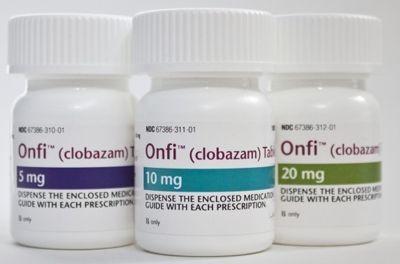Top Class Actions’s website and social media posts use affiliate links. If you make a purchase using such links, we may receive a commission, but it will not result in any additional charges to you. Please review our Affiliate Link Disclosure for more information.

“Patients taking Onfi should seek immediate medical treatment if they develop a rash, blistering or peeling of the skin, sores in the mouth, or hives,” according to the FDA’s Onfi Steven Johnson Syndrome warning.
“Health care professionals should discontinue use of Onfi and consider an alternate therapy at the first sign of rash, unless it is clearly not drug-related,” the federal agency added.
“These rare but serious skin reactions, called Stevens-Johnson syndrome (SJS) and toxic epidermal necrolysis (TEN), can occur at any time during Onfi treatment. However, the likelihood of skin reactions is greater during the first 8 weeks of treatment or when Onfi is stopped and then re-started. All cases of SJS and TEN in the FDA case series have resulted in hospitalization, one case resulted in blindness, and one case resulted in death,” the FDA stated further.
The FDA cautions that patients should consult with their doctor before stopping Onfi since doing so suddenly can cause serious withdrawal problems, such as seizures that will not stop, hallucinations (hearing or seeing things that are not real), shaking, nervousness, and stomach or muscle cramps.
While Onfi has been marketed outside the United States for some 40 years under various brand names for the treatment of anxiety and seizures, it only received FDA approval in the United States in October 2011.
Between then and September 2013, according to the FDA, doctors prescribed approximately 31,000 patient prescriptions from outpatient retail pharmacies. In conjunction with other anti-seizure medications, Onfi (benzodiazepine) is approved to treat patients 2 years old and older suffering from Lennox-Gastaut Syndrome (LGS), a severe form of epilepsy.
In early 2014, a Texas couple filed an Onfi lawsuit against manufacturer Lundbeck Pharmaceuticals, alleging that their 11-year-old son was permanently disfigured and traumatized after developing Stevens-Johnson Syndrome (SJS) and the more severe form of it known as toxic epidermal necrolysis (TEN).
The couple’s son, who had epilepsy but not Lennox-Gastaut Syndrome, was prescribed Onfi for the off-label use to treat epilepsy, something the couple alleges that Lundbeck Pharmaceuticals marketed.
Large swaths of the child’s skin on his body blistered, burned, and fell off, “including the inside and outside of his mouth, throat, and genital areas,” according to the Onfi SJS lawsuit.
He spent a month in the hospital and has been left with permanent scars and psychological injuries, the Onfi SJS lawsuit said.
Shortly afterward, the FDA mandated the Onfi warning label to include SJS risks. The Onfi SJS lawsuit claims that Lundbeck was aware of the SJS risks long before the FDA warning and before the plaintiff’s reaction.
The FDA has observed an increase in SJS and TEN cases in Onfi users.
SJS and TEN are extremely painful conditions that begin with flulike symptoms – fever, fatigue and sore throat – and then manifest with lesions and ulcers forming on the mouth, lips, genital and anal regions followed by rashes covering the body.
The rashes look like burns and open sores and result in skin sloughing off in large swaths. Painful blisters also develop on the mucous membranes, such as the eyes, nose, mouth and genitals. Patients experience joint and muscle pain and a sensation that their body is burning.
Do YOU have a legal claim? Fill out the form on this page now for a free, immediate, and confidential case evaluation. The Stevens Johnson Syndrome attorneys who work with Top Class Actions will contact you if you qualify to let you know if an individual lawsuit or class action lawsuit is best for you. [In general, SJS lawsuits are filed individually by each plaintiff and are not class actions.] Hurry — statutes of limitations may apply.
ATTORNEY ADVERTISING
Top Class Actions is a Proud Member of the American Bar Association
LEGAL INFORMATION IS NOT LEGAL ADVICE
Top Class Actions Legal Statement
©2008 – 2024 Top Class Actions® LLC
Various Trademarks held by their respective owners
This website is not intended for viewing or usage by European Union citizens.
Get Help – It’s Free
Help for Victims of Onfi Stevens Johnson Syndrome
If you or a loved one were diagnosed with Stevens Johnson Syndrome (SJS) or toxic epidermal necrolysis (TEN) after taking Onfi, you may be eligible to take legal action against the drug’s manufacturer. Filing an Onfi SJS lawsuit or Onfi class action lawsuit may help you obtain compensation for medical bills, pain and suffering, and other damages. Obtain a free and confidential review of your case by filling out the form below.
An attorney will contact you if you qualify to discuss the details of your potential case at no charge to you.
Oops! We could not locate your form.












